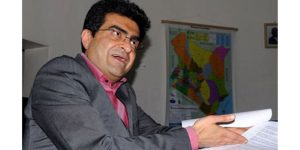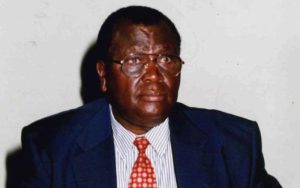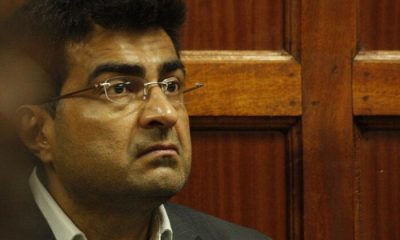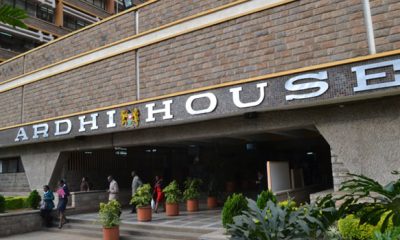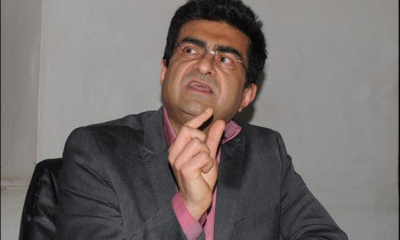Investigations
How Bishop Mark Kariuki’s Deliverance Church Became Vehicle for Sh10 Billion Land Fraud
With church leaders silent, Pattni-linked companies claiming legitimacy, and the Kanyotu estate in protracted succession battles, thousands of families face financial ruin.
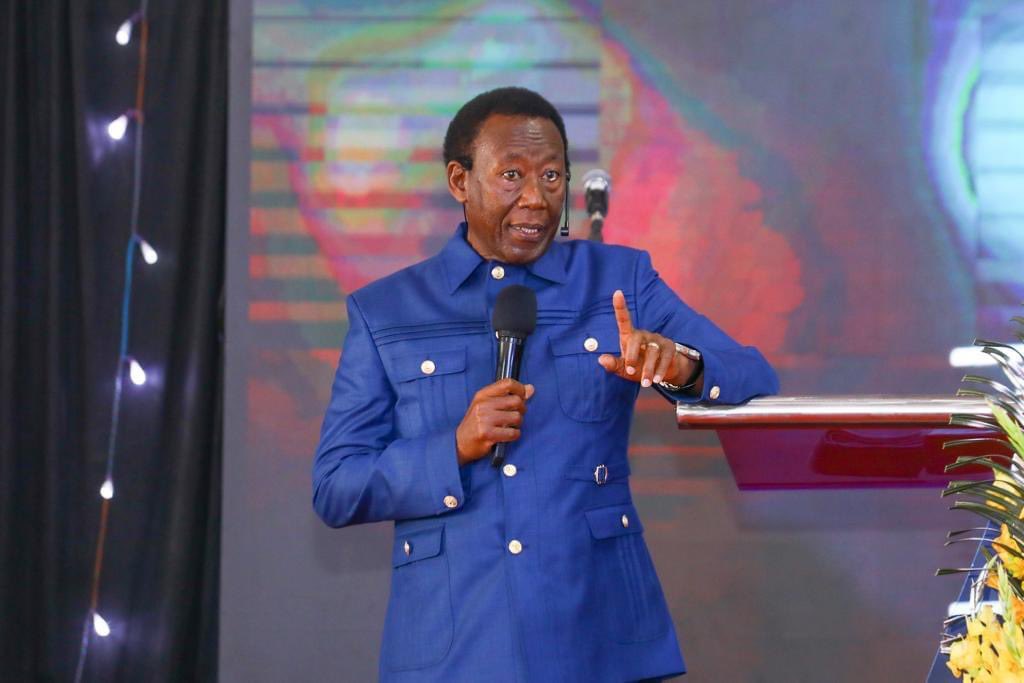
Explosive investigation reveals how religious leaders, Goldenberg mastermind Kamlesh Pattni, and late spymaster’s estate orchestrated Kenya’s largest church-backed land scam
In what could be Kenya’s largest church-backed investment scandal, thousands of faithful believers have lost approximately Sh10 billion in a sophisticated land fraud scheme that weaponized religious trust to fleece congregants across the country.
Investigation has uncovered how Bishop Mark Kariuki’s Deliverance Church network became the unwitting front for a complex web of forgery, corruption, and illegal land transactions orchestrated by Goldenberg scandal mastermind Kamlesh Pattni and associates linked to the estate of former intelligence chief James Kanyotu.
The Sunday Sermon That Launched a Billion-Shilling Scam
It began as a typical Sunday service in 2014 at Deliverance Church Kasarani, Nairobi. But what started as worship quickly transformed into what congregants thought was a divine opportunity for homeownership.
Church elders announced the launch of “Imani Estate” – a sprawling 500-acre residential development in Ruiru, Kiambu County, where plots measuring 50×100 feet were being offered at between Sh2.5 million and Sh4.4 million.
The sales pitch was compelling: prime land in the heart of Ruiru town, marketed by trusted religious leaders, sold through the church’s commercial arm, Ukombozi Holdings Limited.
For thousands living as tenants in Kasarani, Zimmerman, Githurai 45, and Mwiki, it seemed like answered prayers.
“Sadly, we were duped by the men of God who were not honest enough to tell us that the property they were selling was not legally theirs,” Michael Kamau, who invested Sh9 million in two plots and built a Sh34 million luxury maisonette said.
The Goldenberg Connection
Court documents reveal the sophisticated fraud began with land originally owned by Kangaita Coffee Estates Limited, where late intelligence supremo James Kanyotu held majority shareholding.
After Kanyotu’s death in 2008, the 500-acre property became part of his contested estate, with High Court restraining orders prohibiting any transactions.
Despite these legal restrictions, the land was allegedly sold to Trendsetters Investments Limited – a company linked to Kamlesh Pattni, the controversial businessman at the center of the Sh158 billion Goldenberg scandal that nearly bankrupted Kenya in the 1990s.
In a labyrinthine scheme, Trendsetters then “sold” the land to Marriott Africa International Limited, which subdivided it into over 1,000 plots before fraudulently transferring ownership to Ukombozi Holdings Limited – the church’s investment vehicle.
Business Registration Service records show Ukombozi Holdings is owned by Bishop John Masinde (founder of Deliverance Church International), Bishop Mark Kariuki (General Overseer of Deliverance Churches Kenya), and three associates: Peter Keefar Njogah, Jim Kenny Kimani, and George Gichana.
Forensic Evidence Exposes Forgery
The house of cards began collapsing when two forensic document examiners – Chief Inspector Bernard Cheruiyot and Vincent Chelongo – testified that key documents used to legitimize the land transactions were sophisticated forgeries.
“After examining the questioned signatures, he concluded that the letters of consent were forgeries,” Justice Oguttu Mboya noted in his damning July 10, 2025 judgment that declared the entire transaction “null and void.”
The investigation revealed that consent letters dated July 26, 2012, and May 6, 2014, allegedly authorizing the land sale, were fabricated.
These forged documents became the foundation for transferring billions of shillings worth of property from the Kanyotu estate to Pattni’s network.
Victims Speak Out
Stephen Mbugua represents thousands of victims caught in the web of religious manipulation and financial fraud.
In 2018, he paid Sh2.5 million for a 50×100 plot directly to Ukombozi Holdings. By January 2019, he had invested an additional Sh9 million in a residential house, financing it through a Sacco loan.
“I deposited the money directly to Ukombozi Holdings Limited and came to learn about active court cases on the property after I had paid for the land,” Mbugua revealed.
“What is troubling is that as we speak, all our leases stand cancelled through a gazette notice and the people who sold the property to us are nowhere to answer our questions.”
Mercy Wanjiku, whose husband paid Sh3 million for a plot, expressed shock that government-issued documents could be subsequently cancelled.
“How can the government claim our ownership documents are forgeries yet they came from their office and we have previously used the same documents to acquire loans?” she questioned.
The Pattni-Kanyotu Nexus
Court testimony revealed the intricate relationship between the scandal’s key players.
Willy Kihara, claiming to be Kanyotu’s son, testified that “Ukombozi Holdings Ltd is selling the land on behalf of Kamlesh Pattni.”
This connection links the current fraud to Kenya’s most notorious financial scandal – Goldenberg – where Pattni’s companies received billions in fraudulent export compensation claims for non-existent gold and diamond exports.
The investigation uncovered suspicious corporate structures suggesting coordinated deception.
Marriott Africa International Limited and Trendsetters Investment Limited – supposedly separate entities in the transaction chain – shared the same Westlands postal address and had overlapping shareholding through Jophece Yego.
Government Gazette Cancels Thousands of Titles
On August 15, 2025, the government issued Gazette Notice Number 11373, ordering all affected persons to surrender titles derived from the illegal subdivision of Land Reference Number 11261/76 within 90 days, or face automatic cancellation.
“Notice is given to all affected persons to surrender all titles resultant of the illegal subdivision to the office of the Chief Land Registrar,” declared P.M. Ng’ang’a, Registrar of Titles.
The order affects thousands of homeowners who invested life savings based on church endorsement and government-issued documentation.
The scandal has drawn in high-profile political figures, with Lands Cabinet Secretary Alice Wahome facing accusations from Kiambu Senator Karungo Wa Thang’wa regarding her alleged involvement.
Wahome, who previously represented Margaret Nyakinyua (Kanyotu’s widow) in estate matters, has denied wrongdoing and threatened defamation action.
Bishops Silent as Empire Crumbles
Despite multiple attempts to reach Bishop Mark Kariuki and Bishop John Masinde for comment, both religious leaders have remained conspicuously silent.
Neither responded to calls or text messages requesting explanation of how they advertised contested land to congregants or whether sale agreements contained refund clauses.
Their silence contrasts sharply with their previous prominent church appearances promoting the “divine opportunity” that has left thousands financially devastated.
Systemic Failures Exposed
The Imani Estate scandal exposes critical weaknesses in Kenya’s land governance and religious oversight systems:
Registry Failures: Government offices processed transactions despite existing court injunctions, raising questions about internal controls and possible corruption.
Religious Exploitation: Churches operating commercial entities without adequate regulatory oversight, using spiritual authority to market questionable investments.
Judicial Gaps: Complex ownership disputes spanning multiple courts – magistrates’, High Court, Tribunal, Court of Appeal, and Environment and Land Court – creating procedural delays that benefit fraudsters.
Due Diligence Vacuum: Thousands invested based purely on church endorsement without independent verification of ownership or legal status.
The Goldenberg Playbook Revisited
The Imani Estate fraud bears striking similarities to Pattni’s Goldenberg methodology: complex corporate structures, forged documentation, exploitation of government processes, and targeting of ordinary citizens through trusted intermediaries.
Where Goldenberg used export compensation schemes, the current fraud weaponized religious faith and homeownership aspirations to separate victims from their money.
Seeking Justice
Victims have secured a three-month court stay order while pursuing legal remedies, but prospects for recovery remain uncertain.
With church leaders silent, Pattni-linked companies claiming legitimacy, and the Kanyotu estate in protracted succession battles, thousands of families face financial ruin.
Michael Kamau’s Sh34 million maisonette now stands on contested ground, facing possible demolition.
His investment represents just one family’s shattered dreams multiplied across thousands of victims who trusted their church leaders’ endorsement.
The Imani Estate scandal represents a devastating betrayal of religious trust, exploiting the faithful’s desire for homeownership to facilitate Kenya’s largest church-backed investment fraud.
As court battles continue and victims seek justice, the case stands as a stark warning about the vulnerability of ordinary citizens when religious authority, criminal sophistication, and systemic governance failures converge.
For the thousands of families facing financial devastation, the promised land of Imani Estate has become a testament to how easily faith can be weaponized by those who see congregation as customers and salvation as a sales opportunity.
Editorial Note: This investigation is based on court documents, victim testimonies, and public records. Bishops Mark Kariuki and John Masinde were contacted multiple times for comment but did not respond by press time.
Kenya Insights allows guest blogging, if you want to be published on Kenya’s most authoritative and accurate blog, have an expose, news TIPS, story angles, human interest stories, drop us an email on [email protected] or via Telegram
-

 Grapevine1 week ago
Grapevine1 week agoAlleged Male Lover Claims His Life Is in Danger, Leaks Screenshots and Private Videos Linking SportPesa CEO Ronald Karauri
-

 Lifestyle2 weeks ago
Lifestyle2 weeks agoThe General’s Fall: From Barracks To Bankruptcy As Illness Ravages Karangi’s Memory And Empire
-

 Grapevine4 days ago
Grapevine4 days agoRussian Man’s Secret Sex Recordings Ignite Fury as Questions Mount Over Consent and Easy Pick-Ups in Nairobi
-

 Investigations2 weeks ago
Investigations2 weeks agoEpstein Files: Sultan bin Sulayem Bragged on His Closeness to President Uhuru Then His Firm DP World Controversially Won Port Construction in Kenya, Tanzania
-

 Business2 weeks ago
Business2 weeks agoKRA Can Now Tax Unexplained Bank Deposits
-

 Investigations1 week ago
Investigations1 week agoEpstein’s Girlfriend Ghislaine Maxwell Frequently Visited Kenya As Files Reveal Local Secret Links With The Underage Sex Trafficking Ring
-

 Investigations1 day ago
Investigations1 day agoMulti-Million Dollar Fraud: Three Kenyans Face US Extradition in Massive Cybercrime Conspiracy
-

 News2 weeks ago
News2 weeks agoState Agency Exposes Five Top Names Linked To Poor Building Approvals In Nairobi, Recommends Dismissal After City Hall Probe

